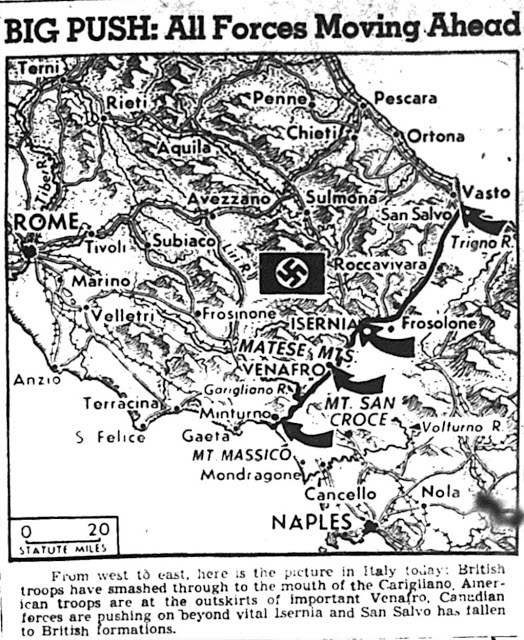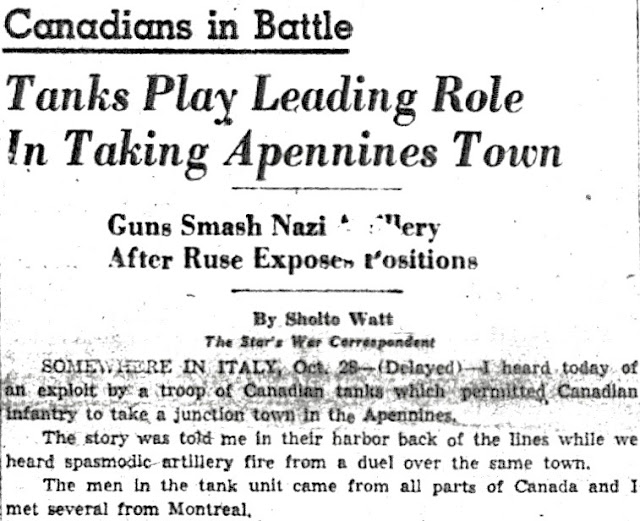Where's Sholto? Adriatic Sea, Then With Canadian Troops
I may have missed Mr. Watt's reports (Drat!) from the early days of the invasion of Italy in the Reggio di Calabria region (Sept. 3, 1943) but I was able to locate articles written while he was travelling in the Adriatic Sea, opposite side of Italy.
His observations and descriptions related to his 'tour of duty' are informative, at the very least, and help us - in detailed fashion - travel back in time about 80 years without even leaving our chairs.
Below readers will find passages or excerpts from two of his many reports after Italy had been invaded. The first are from The Star, October 21.
Headlines from October 21, 1943 - The Montreal Star
Right Under Their Noses
identified as enemy activity either at sea or ashore.
Our force slipped out of harbour, cutting smoothly
and silently over the calm sea, and I was much struck
by the prosaic way the ship's officers and men
faced the beginning of this adventurous mission.
An excellent meal was served in the wardroom;
soup, fish, meat and a glass of Chianti,
though the officers are quite abstemious* before
the possibility of action. Dinner conversation ran
from sport to England in the post-war world and
naval personalities. Those who were not on watch,
"put their heads down" to take a little sleep before
action stations were called, and men were sleeping
in their clothes along the corridors near their posts.
Nearing the coast, nearly all officers were on
the bridge, and there were some few exciting minutes
when a mysterious red light burst out,
flashing some distance from the south.
But this was judged not worth investigating and
we proceeded on our schedule route northward.
In the moon, villages and the features of dark hills
could be clearly distinguished. An occasional glimmer of
light in the houses showed that Yugoslavs were still up,
probably on work not pleasing to the Germans,
while we believed there were also patriot watchers
on the peaks, to whom our presence was a sign
of Allied power and a symbol
of the hope of deliverance.
Most of us were wearing
thick coats in the chilly air.
Presently the patrol became monotonous,
by the very lack of evidence of opposition,
and the officers who were not on duty
began slipping away to take more sleep.
Soon we reached the last point in our patrol and
turned sharply away from the glimmering hills
and I went below to sleep.
This was only one of the Royal Navy's
patrols along the coast, but it interest lies
in the fact that we went so far along this shore,
and so close to it.
These patrols by the Navy and Air Force, backed
by our ever-increasing force on the Italian shore,
have made the lower Adriatic ours, and rendered
perilous in the extreme one of the German's
few remaining sea routes around Europe.
*not self-indulgent, especially when eating and drinking.
“We only had one bottle.” “Very abstemious of you.”
(I include the dictionary definition of 'abstemious' because I feel a few of us may never have used the word in a sentence).
* * * * *
Sholto Watt wrote a good deal about Bari, "the second largest city after Naples to have been liberated in Southern Italy," and the picture he provides is worth at least a 1,000 words!
Bari may be about as far from Rome (key Allied target) as from Reggio,
where Canadians in Combined Operations transport troops and supplies.
Map as found at The Happy Hermit
Alleys Uproarious With Humanity
The Germans left in such a hurry -
and it now seems they were bluffed out of the place -
that they had no time to do material damage to the city or
port installations other than sink four ships in the harbour.
Enemy reconnaissance planes come over every day,
and what they see of shipping in Bari's port before they
are chased away by our fighters must be very discouraging.
Officers from the Italian Navy came here from Rome
with news that the Germans were busy stealing,
and sending home, large numbers of works of art,
and are mining the approaches to Rome in a
feverish way that suggests they intend to make
the Eternal City another German battlefield.
Bari, itself, having seen practically
no fighting, bears few marks of war.
It is sharply divided between a large
and uninteresting modern city and a
mediaeval quarter of winding and picturesque
alleys, off which open living rooms of houses,
divided from the street often only by a light curtain.
These alleys are uproarious with humanity,
with endless children underfoot -
Bari was winner of Mussolini's contest for the city with
the largest birthrate and I imagine it won hands down.
One of Bari's surprises for me was the discovery
that the notorious Radio Bari, a great mouthpiece
for Axis propaganda, was a sheer myth.
It never existed here at all,
but was a powerful station in Rome,
controlled wholly by Radio Rome.
I have been unable to hear any short-wave here,
but presume Radio Rome has now been forced
to stop calling itself Radio Bari.
Here at Bari I am taking leave
of my kind hosts of the Royal Navy
and am proceeding to the land front to see
something of Canadian troops in action.
Sholto Watt
October 21, 1943.
* * * * *
We read of Sholto Watt's adventures with Canadian troops about one week later. The Canucks were heading toward Isernia and San Salvo (and not there yet; the map below is from a later date). Below the map readers will find Mr. Watt's first article, I believe, since his time with the Royal Navy on the Adriatic Sea. He said he would accompany Canadian troops and he did so, though his article was delayed for some reason.
Article is dated Oct. 28, and appeared on Nov. 1, 1943
Enemy Mortar Positions, Well and Truly Spotted
To discover enemy positions
on high ground overlooking the town, they made
a patrol several miles in one direction, meeting no
opposition, then a few miles in another direction,
when they met considerable mortar fire.
They returned the fire vigorously but
could not spot the enemy position accurately.
So they retired a short way behind a ridge themselves
and then a decoy tank was sent out by the troop leader...
The decoy was able to draw enemy mortar fire
and enable mortar positions to be spotted...
When they had returned to the rest of the troop,
the mortar positions had been well and truly spotted
and the tanks opened fire.
Apparently it all was very effective,
as the mortar fire practically ceased,
and the infantry was able to come and consolidate positions
for holding the town, which is of considerable importance
as a road junction and observation post.
I came to call on the unit in camp
in a grove of oaks on a hillside,
from which we could see German guns,
in flashes, on distant hills...
The unit had fought its way up through Italy
from the first day of the invasion.
The tank men had a long and hard journey.
They were having their first rest of the campaign
and one or two of the squadron commanders
had a program for three days' solid sleep
after the most pressing work was done.
The townsfolk had suffered extremely
at the hands of the Germans, who had established there
in strength, and were correspondingly glad to see our men.
They came out with bottles of wine, with flowers and
offers of meals - there seems to be no food shortage
in the Apennine towns. They had, they said, killed six Fascists
of the few that remained behind after the Germans left.
Hitler's forces in retreat. His stamp of authority is weakening.
Excerpt from same article, Montreal Star, Nov. 1, 1943
Sholto Watt continues:
Children Oblivious to the Sound of Guns
I am writing this dispatch
a few miles behind the lines in one of
the most bizarre battlefields I have seen.
Day is dying in a sunset of unsurpassable and
dramatic splendor, a multiplicity of strange-hued clouds
crimsoning against the sky of deepening blue;
a back-cloth to a landscape of hills topped with
little white towns, or outcrops of rock, their slopes
often covered with woods of oak, birch and poplar.
Elsewhere there is a patchy cultivation or grass fields.
The valleys are darkening already and
rich shadows are sweeping across the fields.
In the little house where I am writing, soldiers are
preparing an evening meal, sorting kit and washing.
Only a few yards away there is a gun position,
with men ready for action. A kittle further away
are other gun sites and I can see the flashes as
our men fire at the germans - flashes followed by
sharp vicious reports; then, in return, the dull boom of
German guns several miles away on the wooded heights.
In the sky one of our planes is veering in great
circles, sometimes flashing gold as it reflects the sun.
Meanwhile, all around me,
Italians are carrying on their primitive farm work.
Children are playing or staring at the soldiers,
oblivious to the sound of the guns,
apparently under the impression that the war
has nothing to do with them.
Down the valley towards the enemy
I can see a little bivouac fire. A few minutes more
and it will be put out, while darkness covers
the whole strange scene, save where
sudden stabs of flames will show where
the gunners fight out their stubborn duel.
Sholto Watt,
November 1, 1943
Please link to Passages: Sholto Watt, War Correspondent for The Montreal Star (1)
Unattributed Photos GH









No comments:
Post a Comment